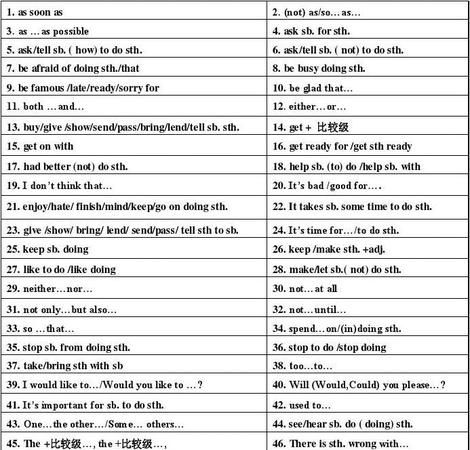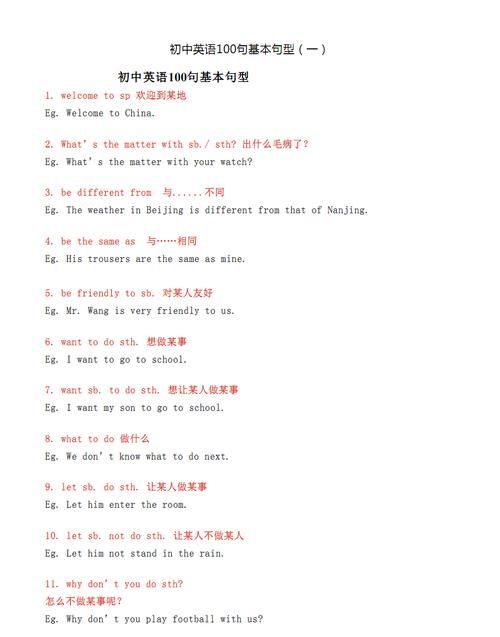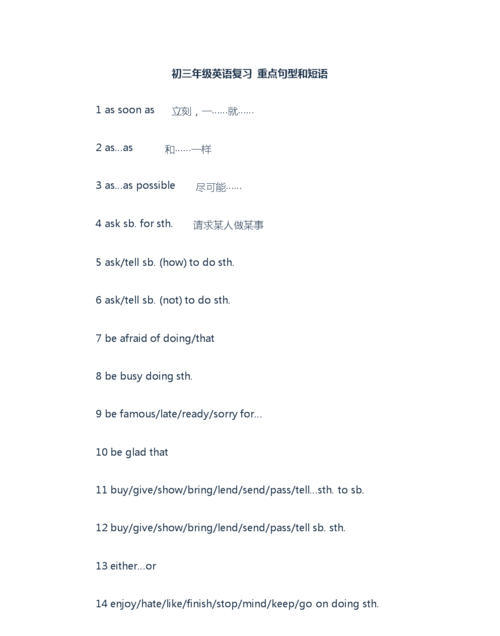本文目录
英语各种时态的概念和句型结构
一、一般现在时:
概念:经常、反复发生的动作或行为及现在的某种状况。
时间状语: always, usually, often, sometimes, every week (day, year, month…), once a week, etc.
基本结构:①be动词;②行为动词
否定形式:①am/is/are+not;②此时态的谓语动词若为行为动词,则在其前加don't,如主语为第三人称单数,则用doesn't,同时还原行为动词。
一般疑问句:①把be动词放于句首;②用助动词do提问,如主语为第三人称单数,则用does,同时,还原行为动词。
二、一般过去时:
概念:过去某个时间里发生的动作或状态;过去习惯性、经常性的动作、行为。
时间状语:ago, yesterday, the day before yesterday, last week(year, night, month…), in 1989, just now, at the age of 5, one day, long long ago, once upon a time, etc.
基本结构:①be动词;②行为动词
否定形式:①was/were+not;②在行为动词前加didn't,同时还原行为动词。
一般疑问句:①was或were放于句首;②用助动词do的过去式did 提问,同时还原行为动词。
三、现在进行时:
概念:表示现阶段或说话时正在进行的动作及行为。
时间状语:now, at this time, these days, etc.
基本结构:am/is/are+doing
否定形式:am/is/are+not+doing.
一般疑问句:把be动词放于句首。
四、过去进行时:
概念:表示过去某段时间或某一时刻正在发生或进行的行为或动作。
时间状语:at this time yesterday, at that time或以when引导的谓语动词是一般过去时的时间状语等。
基本结构:was/were+doing
否定形式:was/were + not + doing.
一般疑问句:把was或were放于句首。
五、现在完成时:
概念:过去发生或已经完成的动作对现在造成的影响或结果,或从过去已经开始,持续到现在的动作或状态。
时间状语:recently, lately, since…for…,in the past few years, etc.
基本结构:have/has + done
否定形式:have/has + not +done.
一般疑问句:have或has。
六、过去完成时:
概念:以过去某个时间为标准,在此以前发生的动作或行为,或在过去某动作之前完成的行为,即“过去的过去”。
时间状语:before, by the end of last year(term, month…),etc.
基本结构:had + done.
否定形式:had + not + done.
一般疑问句:had放于句首。
七、一般将来时:
概念:表示将要发生的动作或存在的状态及打算、计划或准备做某事。
时间状语:tomorrow, next day(week, month, year…),soon, in a few minutes, by…,the day after tomorrow, etc.
基本结构:①am/is/are/going to + do;②will/shall + do.
否定形式:①was/were + not; ②在行为动词前加didn't,同时还原行为动词。
一般疑问句:①be放于句首;②will/shall提到句首。
八、过去将来时:
概念:立足于过去某一时刻,从过去看将来,常用于宾语从句中。
时间状语:the next day(morning, year…),the following month(week…),etc.
基本结构:①was/were/going to + do;②would/should + do.
否定形式:①was/were/not + going to + do;②would/should + not + do.
一般疑问句:①was或were放于句首;②would/shou

初中英语句型汇总
希望用得到哦
初中英语12种常见句型讲析
句型(一)
such+名词性词组+that…
So+形容词/副词+that…——如此……以致……
例如:(1)She is such a good teacher that we all love her.她是一个好老师,我们都爱她。
(2)It was such a hot day that they didn’t go out for a walk as usual.这么热的天气,他们没有像往常一样去散步。
注意点:
1.such+a+形容词+名词+that…,可以改写成:so+形容词+a+名词+that…,例句(1)可以改写成:She is so good a teacher that we all love her.
2.在such+形容词+名词复数或不可数名词+that…结构中,形容词如果是many/few或much/little时,用so不用such,即:so+many/few+可数名词复数+that…,so+much/little+不可数名词+that…
(1)There are so many people in the room that I can’t get in.房间里人太多,我进不去。
(2)The man has so much money that he can buy a car.那人很有钱,他能买一辆小汽车。
句型(二)
There be…,either…or…,neither…nor…,not only…but also…
例如:(1)There is a pen and two pencils in his pencil-box.他的铅笔盒里有一支钢笔和两支铅笔。
(2)Not only you but also I have been to the Great Wall.你和我都没有去过长城。
(3)Either you or I am leaving for Shanghai.要么你去上海,要么我去上海。
(4)Neither you nor he is right.你和他都不对。
(5)Both Jack and Tim are English.
Jack和Tim是英国人。
注意点:
当这几个句型连接主语时,谓语动词的人称和数要考虑“就近原则”,对比both…and… 来记忆,both…and…连接主语时视为复数。
句型(三)
Enough+名词+to do…——有足够的……做某事
形容词/副词+enough+to do …——足够……做某事
例如:(1)There is enough room to hold these people to have a meeting.有足够的地方容下这些人开会。
(2)The boy is strong enough to carry the heavy box.这个男孩力气够大,能搬动这只箱子。
注意点:
enough做副词修饰形容词或副词时,放在所修饰词的后面,句子可以用so…that…句型改写。例句(2)可以改写为:The boy is so strong that he can carry the heavy box.这个男孩力气很大,能搬动这只箱子。
句型(四)
too+形容词/副词+to do…——太……以致不能……
例如:(1)I was too excited to say a word.我激动得一个字也说不出来。
(2)Tom is too short to reach the apple. Tom太矮了,拿不到那个苹果。
注意点:
这是一个否定句型,不能在不定式前加 not,可以用so…that…结构改写,例如例句(1)可以改写成:I was so excited that I couldn’t say a word.
句型(五)
So that …——以便/以致……
例如:(1)They studied hard so that they could pass the exam.他们学习很努力,为了能通过考试。
(2)They started early so that they caught the early bus.他们起得很早,结果赶上了早班车。
注意点:
在例句(1)中,是引导目的状语;在例句(2)中,是引导结果状语。一般来讲,从句中含有情态动词的,为目的状语。无情态动词的,为结果状语。
句型(六)
祈使句+then/or/and+陈述句
例如:(1)Work hard,and/then/and then you will live a happy life.努力工作,你就会过上幸福生活。
(2)Hurry up, or we will be late for school. 快点,否则我们上学就迟到了。
注意点:
以上句型都可以用条件状语从句来改写。例句(2)可以改写成:If we don’t hurry up,we’ll be late for school.
句型(七)
(1)It’s time for sth.是干某事的时间了。
It’s time (for sb) to do sth.该干某事了。
It’s time that sb did sth.该干某事了。
例如:(1) It’s time for the meeting.该开会了。
(2)It’s time for us to go to school.我们该上学了。
(3)It’s high time that you went to bed.你该上床休息了。
注意点:
在句型(3)中,可以在time前加rush、 high等修饰词,这个句型是虚拟语气的一种,含有“稍迟一点”的含义。而(2)则是“正是干某事的时候”。
句型(八)
(1)It takes sb. Some time to do sth.干某事花某人一些时间
(2)sb. spend some time on sth./(in) doing sth.某人花时间在某事上/花时间干某事
(3)spend some money on sth./(in) doing sth.花钱在某物上/花钱干某事
(4)sth. cost sb. Some money——某事花某人一些钱
(5)pay some money for sth.为某事(物)付钱
例如:(1)It took me two hours to write the letter.写这封信花了我两小时的时间。
(2)He spends half an hour (in) reading English every morning.他每天早上花半小时读英语。
(3)He spends one hour on the housework every day.他每天花一小时做家务。
(4)The bike cost me 298 yuan.这辆自行车花了我298元。
(5)I spent 298 yuan on the bike.我买这辆自行车花了298 元。
(6)I paid 298 yuan for the bike.我花了298元买这辆自行车。
注意点:cost主语一般为物;spend、pay主语一般为人。例(1)中it 用做形式主语,动词不定式为真正主语。
句型(九)
(1)Why not do…?为什么不干某事?
(2)Let’s do …让我们干某事吧。
(3)Shall we do …?我们干某事好吗?
(4)Would you like something/to do sth.…?你想要什么吗?你想要干…吗?
(5)Will you please do …?请你干某事好吗?
(6)What (How) about doing…?干某事怎么样?
例如:(1)Why not go and ask our teacher?Good idea!Let’s go.为什么不去问问老师?好主意!走吧!
(2)Shall we go out for a walk?No, let’s go to the zoo.我们去散步怎么样?不,我们去动物园吧。
(3)Will you please fetch some chalks for me?请你给我拿些粉笔,好吗?
(4)What about singing an English song? Wonderful!唱首英语歌曲怎么样?好极了!
注意点:这些句型都是表示“建议”的句子,可视为同义句。
句型(十)
(1)Let’s go out for a walk,shall we?让我们出去散步,好吗?
(2)Read the book carefully,will you?认真读书,好吗?
注意点:在这两个句型中,(2)所代表的祈使句,一般用will you构成反意疑问句。在(1)中Let’s表示包括“我”在内,用shall we,但若是let us,表示不包括“我”在内,则用will you。
例如:Let us go out for a walk,will you?你让我们出去散散步,好吗?
句型(十一)
So+be/助动词/情态动词+主语——也……
Neither/Nor+be/助动词/情态动词+主语——也不……
例如:(1)He can sing a lot of English songs,so can she.他会唱很多英语歌曲,她也是。
(2)She speaks English very well,so do I.她英语说得好,我也是。
(3)Li Lei hasn’t read this book,neither has Lin Feng.李蕾没看过这本书,林风也没看过。
注意点:这两个句型都表示和前面所陈述的内容相同,用倒装句。要注意和 “so+主语+be/助动词/情态动词——确实是”相区别,试对比一下例(2):
A:She speaks English very well.她英语说得很好。
B:so she does.确实是这样。
句型(十二)
I don’t think his answer is right.我认为他的答案不对。
例如:(1)I can’t believe she is right.我相信她是不对的。
(2)You don’t think they will come tomorrow, do you?你认为他们明天不会来,是吗?
注意点:Think、believe、suppose 等接宾语从句时,表示否定时否定主句。变为反意疑问句时,若主语是第一人称,简短问句与宾语从句的主谓语保持一致, 若主句主语是其他人称,与主句主谓语保持一致。例(1)变为反意疑问句应为:I can’t believe she is right,is she?
附Ⅰ——动词的四种形式
A、动三单的变法
1) “辅+y”结尾, 变y为i加es
2) “以s; sh; ch; x; o结尾, 加es
3)直接加s
但have----has
B、现在分词的变法
1)去e加ing (e不发音)
2)双写加ing (“辅元辅”结尾且重读,y;w列外)
3)直接加ing
写出下列动词的现在分词
1.see_______2.come ________3.stop_______
4.open _______5.listen_______6.drop ______
7.prefer________8.fix_______ 9.relax ______
10.die _______11.tie _______12.lie _______
C、动词的过去式和过去分词
(一)不规则变化(见课本不规则变化表P255)
(二)规则变化
1) “辅+y”结尾,变y为i加ed
2)双写加ed
3)直接加ed
写出下列动词的过去式和过去分词
1.drop ______ _______2.stop ______ ______
3.prefer ________ _________
4.study ______ ______5.try ______ ____
6.fix _____ ______ 7.relax ______ ______
附Ⅱ——情态动词(can/ could; may/ might; must; should)+动原
1.must(必须)——needn’t(不必)
may(可以)——mustn’t(不许;不准;不可以)
2.注意几个题:
1)—May I go with you?
—No, you _________.
2)—Must I turn off the light now?
—Yes, you ______/ No, you _________
附Ⅲ——动词不定式与动名词
A、动词不定式作宾补
1)tell / ask / want sb to do ______________
否定式:tell/ask/want sb not to do __________
____________________
2)省to不定式作宾补
即:(l, m, n, 3h, 2看, 1f) sb do
l—let; m—make; n—notice; 3h—hear, have, help; 2看—see, watch; 1f—feel
但注意:1)help sb (to) do (to可省、可不省)
2)在改作被动语态时省去的to应还原
eg. Someone heard him sing in the room.
He was heard to sing in the room.
B、动词不定式与动名词的区别
1.(hope; learn; want=would like; decide) to do
2.(enjoy; finish; keep; mind; practise) doing
8.介词+doing
eg. 1)What/ How about doing
2)be good at doing
附Ⅳ——宾语从句与状语从句中的时态
1.状语从句中的时态:
主句 时间、条件句
1)一般将来时 2)祈使句 3)情态动词原形 一般现在时
一般过去时 一般过去时
eg.1)I’ll call you as soon as he ______ (come) back.
2)He won’t go to bed until he _________ (finish) his homework.
3)I’ll help you if I _____ (be) free tomorrow
2.宾语从句中的时态:
主句 宾语从句
一般现在时 一切时态
一般过去时 过去范畴的某一时态(一般过去时;过去进行时;过去完成时;过去将来时)
但当宾语从句是指客观事实、普遍真理、自然现象时,则只能用一般现在时。
eg.1)He said his father _________(come) back in two days.
2)The teacher said light ________(travel) faster than sound.
附Ⅴ——主谓一致
1.表“时间、距离、金钱、长度”的名词短语做主语时应看作一个整体,视为三单
eg. Two months is quite a long time.
2.people; police形单实为复,作主为复
eg. The police are looking for the missing boy.
3.maths, news, physics形复实为单,作主为单
4.family; class看作整体时作主语为单数;看作整体中的各成员时则为复数。
eg. 1)My family is a big one.
2)My family are watching TV.
5.由with, except, as well as连接的两名词作主语,谓语由前者决定
eg. The teacher with his students is going to Beijing tomorrow.
6.由neither…nor; either…or; not only…bout also连接的两名词作主语,谓语由后者决定
eg. Neither he nor I am a teacher.
7.不定代词(something; anything; nothing; someone; anyone; everyone…)作主语为三单
Nobody knows it except me.
8.One of + 复名… 作主语为单数
eg. One of my friends is a computer engineer.
9.“the +姓的复数”作主语为复数
eg. The Lius are watching TV now.
10.sheep; deer; fish单复同形,注意区别作主语是单还是复
eg. 1)There are many sheep on the hill.
2)Milk ____ white, and sheep ______ white, too. (be填空)
11.there be结构中,如果有两个以上的名词作主语,则be应与最接近的那个名词一致。(即:靠近原则)eg.
1)There ____a box and some pens on the desk.
2)There ____some pens and a box on the desk.
12. either, neither, each作主语为三单
eg. Neither of the twins ______(like) drawing.

初中英语作文万能句子
哎 自己多写拉.. 初中作文OK的啊. 认识些外国朋友啊. i think it's important for us to **** what's your opione? what about you , please write to me soon. these days we did a **about 作文很多地方叫你写 什么自己感受啊.你就写i think it's ..i don;t think.. 就是写满字 没错字 语法OK 意思OK 时态OK 就OK拉.. 要么像我们老师这样叫我们背 不过我没背过.应为能写出来啊..加油.

初中英语句型大全汇总
50个典型句式::
1. as soon as 一…就…
2. (not) as/so…as 不如
3. as…as possible 尽可能地
4. ask sb for sth.. 请求,要求
5. ask/tell sb. (how) to do sth. 请教/告诉某人如何做…
6. ask/tell sb. (not) to do sth. 请/告诉某人做/不做某事
7. be afraid of doing sth. / that… 害怕做某事/害怕,担心…
8. be busy doing 忙于做某事
9. be famous/late/ready/sorry for… 以…著名
10. be glad that… 高兴…
11. both…and… …与…两者都…
12. buy/give/show/send/pass/bring/lend/tell sb. sth. 为某人买某物
13. either…or 要么…要么…
14. enjoy/hate/finish/mind/keep/go on doing 喜欢做某事
15.get+比较级半功倍 变得越…
16. get on with 与…相处
17. get ready for/get sth. ready 为…做准备
18. give/show/bring/lend/send/pass/ tell sth to sb. 把…给某人
19. had better (not) do 最好做/不做
20. help sb (to) do/help sb. with 帮某人做某事
21. don’t think that... 认为…不…
22. I would like to…/would you like to…? 我想做…
23. It takes sb some time to do sth. 花费某人…时间做某事
24. it’s bad /good for… 对...有害处
25. it’s important for sb to do sth. 对于某人来说做…是重要的
26. It’s time for…/to do sth. 对于…来说是做…的时间了。
27. It’s two meters (years) long (old) 它两米长。
28. keep sb. doing 让某人一直做某事
29. keep/make sth. +adj. 让…一直保持…
30. like to do/like doing 喜欢做…
31. make/ let sb. (not) do sth. 让某人做/不做某事
32. neither…nor 既不… 也不…
33. not…at all 根本不
34. not only…but also 不仅…而且….
35. not…until 直到…才.…
36. one…the other/ some…others 一个…另一个…
37. see/hear sb do (doing) sth. 看见某人做了/正在做某事
38. so…that 如此…以至于…
39. spend...on (in) doing sth. 在…方面花费…
40. stop sb. from doing sth. 阻止某人做某事
41. stop to do/doing 停下来去做某事
42. take/bring sth with sb. 随身携带
43.The+比较级, the+比较级 越…越…
44. There is something wrong with… …出了问题/毛病
45. too…to 太…以至于不能…
46. used to 过去常常
47. What about…/How about…? …怎么样呢?
48. What’s wrong /the matter with…? …出什么问题了?
49. Why not…? 为什么不做…呢?
50. Will (Would, Could) you please…? 你愿不愿意做….呢?
历届考题:
1.很抱歉,我的自行车坏了。请再等我五分钟。
I’m sorry, there is something wrong with my bike. Please wait for me five more minutes.
我的电视机坏了,所以我不能看比赛了。
(1) There is something wrong with my TV, so I can’t watch the match.
我的计算机坏了。你能帮助我修理一下吗?
(2)There is something wrong with my computer. Could you help me mend it?
这台机器坏了。我们最好修理一下它。
(3) There’s something wrong with this machine. We’d better mend it.
2.对于青少年来说,学习如何交友是很重要的。
It’s important for teenagers to learn how to make friends.
虽然雨下得正大,但是对于他来说,看来不跑完最后的200米是不可能的。
(1)Although it is raining heavily, it looks that it’s impossible for him not to finish the last 200 meters.
吃更多的蔬菜是有好处的。
(2)It’s good to eat more vegetables.
对于我们来说拥有充足的睡眠是重要的。
(3) It’s important for us to have enough sleep.
对于我们来说保持环境清洁是重要的。
(4) It’s important for us to keep the environment clean.
嘲笑残疾人是不礼貌的。
(5) It’s impolite to laugh at disabled people.
进行更多的锻炼对你的健康来说是有益的。
(6) It’s good for your health to do more exercise.
在太阳下读书对眼睛是有害的。
(7) It’s bad for eyes to read in the sun.
3.我们应该在适当的时间去晚会,既不能太早,也不能太晚。
We should go to the party just at the right time, neither too early nor too late.
恶劣的天气和穷困的状况都无法改变他在那里教书的决心。
(1) Neither bad weather nor poor condition can change her mind to teach there.
这个社区既不安静也不安全。我不喜欢住在这里。
(2) This neighborhood is neither quiet nor safe. I don’t like living here.
Tom 和Jack都不喜欢骑自行车上学。
(3) Neither Tom nor Jack likes going to school by bike.
4.六月份的考试一结束我的父母就带我去大连度假。
My parents will take me to Dalian for vacation as soon as the examination in June is over.
你一完成作业就给我打电话。
(1) Please call me up as soon as you finish your homework.
他一看完这张DVD他就把它借给你。
(2) He will lend this DVD to you as soon as he finishes watching it.
昨天晚上我一到家妈妈就让我准备晚饭。
(3) My mother asked me to get ready for supper as soon as I got home yesterday evening.
请尽早把这份通知用电子邮件的方式发给我。
(4) Please e-mail me this notice as soon as possible.
5.在每个月的排队日,越来越多的人们排队等候,这有助于防止有人夹塞儿。
On Queuing Day of each month there are more and more people waiting in line。It can help prevent/stop someone from cutting in the queue/ jumping the queue.
虽然交通堵塞让我不能高速驾车,但是我还是喜欢拥有自己的车。
(1) Although traffic jams would stop me from driving fast, I’d still like to have my own car.
6.有时在交通高峰期,开车不如骑自行车快。
Sometimes driving a car is not as/so fast as riding a bike in the rush hours.
有些学生学英语不如学数学努力。
(1) Some students don’t study English as hard as they study math.
西方的孩子们通常准备尽可能多的礼物。
(2) Kids in the West usually get ready for as many gifts as possible.
7.我们最好不要在公共场所大声讲话。
We’d better not talk loudly in public places.
你最好在饭前洗手。
(1)You’d better wash your hands before dinner.
天现在黑了。我们最好回家去。
(2) Its dark now. You’d better go home.
你最好每周帮助父母做些家务。
(3) You’d better help your parents do some housework once a week.
你最好随身带上雨伞。外面的雨下得正大。
(4) You’d better take an umbrella with you. It’s raining hard outside.
8. 对司机来说有些路标太小了看不见。
Some road signs are too small for drivers to see.
Some road signs are so small that drivers can’t see them.
昨晚Kate太生气了一句话也说不出来。
(1)Kate was too angry to say a word last night.
他想在2008年做一名奥运志愿者。现在他正忙着学习英语以至于每天都没有时间玩儿。
(2) He wants to be an Olympic volunteer in 2008. Now he is so busy learning English that he has no time to play every day.
我们的数学老师太生气了一句话都说不出来。
(3) Our math teacher was too angry to say a word. / was so angry that he couldn’t say a word.
过去他花太多的时间玩计算机游戏,以至于他对于学习没有兴趣。
(4)He used to spend so much time playing computer games that he was not interested in his lessons.
听到神州六号成功发射的消息,许多人激动得彻夜未眠。
(5) Hearing the news of successful launch of Shenzhou-6, many people were too excited to sleep the whole night.
这本书太厚了,对于我来说不能读完。
(6) This book is too thick for me to finish reading.
这道数学题太难了,我花了两小时才算出来。
(7) The math problem was so difficult that I spent two hours working it out.
今天晚上的电话让他气愤不已,以至于他一宿没睡。
(8) Tonight’s calls made him so angry that he couldn’t sleep last night.
这个男孩非常喜欢足球,以至于他每天练习两小时。
(9) The boy likes football so much that he practices it for two hours every day.
9.每天早晨在我上学的路上,我欣喜地看到工人们正忙着为奥运会建设体育馆和体操馆。
Every morning, on my way to school, I am happy to see the workers being busy building stadiums and gyms for the Olympics.
我很高兴你能来看我。
(1) I’m very happy that you can come to see me.
10.乘坐D-车组从上海到北京只用十小时。
It takes only 10 hours from Beijing to Shanghai on a Bullet Train.
他每天用多长时间玩计算机游戏?
(1) How long does he spend playing computer games every day?
工人们建成这座大桥将用两年时间。
(2)It will take the workers two years to build the bridge.
建设这座奥运场馆工人们只用了两年时间。
(3)It took the workers only 2 years to build this Olympic Stadium.
她用了三个月时间做这项实验。
(4) It took her 3 months to do this experiment.
我把所有的业余时间用在绘画上了。
(5) I spend all my free time in drawing.
他每天用半小时读英语吗?
(6) Does he spend half an hour reading English every day?
在2008年乘坐磁悬浮火车从上海到杭州你将只用24分钟。
(7) It will take you only 24 minutes from Shanghai to Hang Zhou by magnetic train in 2008.
一项调查表明半数以上的学生每周有四小时用在网络上。
(8) A survey shows that more than half of school students spend 4 hours a week on the Internet.
工人们建设这所新学校要用多长时间?
(9) How long will it take the workers to build the new school?
11.晚饭后出去散步怎么样?
How about going out for a walk after supper?
喝点水怎么样?你看上去有点紧张。
(1)How about drinking water? You look a little bit nervous.
我今天没时间去看他们。明天怎么样?
(2) I have no time to see them today. What about tomorrow?
我要去打球。你呢?
(3) I’m going to play ball games. What about you?
我喜欢这次讲座。你呢?
(4) I like this lecture. What about you?
12.法国以它的美食和美酒著名。
France is famous for its fine food and wine.
13.Bob给我买了一本书作为生日礼物。
Bob bought me a book as a present for my birthday.
我忘了带我的英语书了。你能把你的借给我吗?
(1) I forgot to bring my English book here. Could you lend me yours?
请把这封信寄给她。
(2) Please send her this letter.
14.我认为他不会来了。
I don’t think he will come.
我认为他不会放弃学习。
(1)I don’t think he will give up study.
我认为坐在计算机旁太长时间对眼睛不好。
(2) I don’t think it is good for eyes to sit too long at a computer.
15.学生们知道雨停了才回家。
The students didn’t go home until the rain stopped.
李明每天直到他妈妈回来才去上学。
(1) Li Ming doesn’t go to school until his mother comes back every day.
直到雨停请再离开。
(2) Don’t leave until the rain stops.
Jack昨晚直到他妈妈让他去睡觉才停止看电视。
(3) Jack didn’t stop watching TV until his mother asked him to go to bed last night.
直到他打扫完老人的房间他才停下来休息。
(4) He didn’t stop to have a rest until he finished cleaning the old man’s room.
直到风息了请再打开窗户。
(5) Don’t open the window until the wind stops.
直到昨天和妈妈谈心我才理解妈妈对我的爱。
(6) I didn’t understand my mother’s love to me until I talked with her yesterday.
16.当你遇到困难的时候为什么不求助呢?
Why not ask for some help when you are in trouble?
博物馆非常近。为什么不走路去那儿呢?
(1) The museum is quite near. Why not go there on foot?
为什么不跟我们去看电影呢?
(2) Why not go to a movie with us?
为什么不给他买一本字典呢? 他太需要了。
(3) Why not buy him a dictionary? He is in great need of it.
17.我们本周六去公园,要么坐公共汽车,要么骑自行车去。
We’re going to the park this Saturday, either by bus or by bike.
据说Harry Potter III非常有意思。我知道要么你要么李雷有一本。
(1) Its said Harry Potter III is very interesting. I know either you or Li Lei has got one copy.
Jack的兄弟要么是一名教师,要么是一名大夫。
(2) Jack’s brother is either a teacher or a doctor.
18.老板让工人们不停地工作直到他们完成任务。
The boss kept the workers working all the time until they finished all the work.
这架照相机不能用了。出什么问题了?
19. The camera doesn’t work. What’s wrong with it?
他看起来很悲伤。出什么事了?
(1) He looks very sad/upset. What’s the matter?
20.Tom告诉Mike尽快读完这本书。
Tom told Mike to finish reading this book as soon as possible.
老师告诉学生们直到汽车停下来才能下车。
(1) The teacher told the students not to get off the bus until it stopped.
他的妈妈经常告诉他不要去网吧。
(2) His mother often tells him not to go to the Internet bar.
21.他匆匆忙忙上学,但是上课迟到了。
He hurried to school yesterday, but he missed the class/ was late for class.
22.现在一些新产手机不仅用来玩游戏,而且用来听歌曲。
Today some newly-produced mobile phones are used not only for playing games, but also for listening to songs.
现在一些新产手机不仅用来照相,而且用来从网上下载歌曲。
(1) Today some newly-produced mobile phones can be used not only for taking photos, but also for downloading songs from the Internet.
如果你想学好英语,你不仅要做大量阅读,而且要一直用英语与别人交谈。
(2) If you want to learn English well, you will not only do a lot of reading, but also keep talking with others in English.
23.这些天所有的学生都忙着锻炼身体准备体育考试。
These days all the students are busy exercising to be ready for the physical examination.
中国的许多地方都准备着帮助北京举办奥林匹克运动会。
(1) Lots of Chinese areas are all ready for helping Beijing hold the 2008 Olympic Games.
瞧!学生们正为运动会做准备。
(2) Look! The students are getting ready for the sports meeting.
你准备好明天的运动会了吗?
(3) Are you ready for tomorrow’s sports meeting?
24.六点钟了。该吃晚饭了。
Its six o’clock. It’s time for supper. /It’s time to have supper.
课结束了。我们该打扫教室了。
(1) Class is over. It’s time for us to clean the classroom.
春天来了。该是种树的时间了。
(2) Spring is coming. It’s time to plant trees.
25. I我很抱歉让你等了很长时间。
am sorry to keep you waiting for a long time.
26.我们种的树越多,我们遇到的沙尘暴就越少。
The more trees we plant, the fewer sand and storms we’ll have.
我们种的树越多,我们的环境就越好。
(1) The more trees are planted, the better our environment is.
27.当我到家的时候妈妈总是忙着做饭。
Mom is always busy cooking when I get home.
28.这条新路十米宽。
The new road is 10 meters wide.
29.孩子们总是怕黑。
Children are always afraid of the dark.
现在七点了。我恐怕我们看电影要晚了。
(1) Its seven o’clock now. I am afraid we will be late for the film.
30.我过去经常和他去公园。
I used to go to the park with him.
Kobe的爸爸过去在NBA打球。
(1) Kobe’s father used to play in NBA.
31.你可以把字典递给我吗?我想用字典查一些新生词。
Would you please pass me the dictionary? I’d like to look up some new words in it.
我有两张电影票。你想和我一起去吗?
(1) I’ve got two tickets for the film. Would you like to go with me?
32.今天下午我们不上课了。帮父母做家务吧。
We won’t have any classes this afternoon. Please help parents with the housework.
33.今天天气很好。让我们散步吧。
it’s a fine day today. Let’s go for a walk.
韩小平在都灵奥运会前从没有停止练习。
34. Han Xiaoping has never stopped practicing before the Turin Olympics.

以上就是关于初三英语00个句型公式 ,英语各种时态的概念和句型结构的全部内容,以及初三英语100个句型公式 的相关内容,希望能够帮到您。

